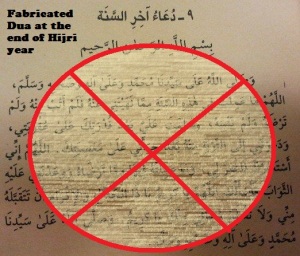End the Hijri year with fasting & Prayers for forgiveness?
As the Hijri year draws to a close, there are many text messages saying that the page recording one’s good deeds will be closed at the end of the year, and urging us to end it with prayers for forgiveness and fasting.
What is the ruling on these messages? Is fasting the last day of the year Sunnah?
Answer:
Praise be to Allaah.
Deeds are Taken Up Twice Daily:
The Sunnah indicates that people’s good deeds are taken up to be shown to Allaah without any delay, twice each day: once at night and once during the day.
It is narrated that Abu Moosa al-Ash3aree (may Allaah be pleased with him) said: “The Messenger of Allaah sallAllaahu 3Alayhi wa sallam stood up before us and told us five things. He said:
“Allaah, may He be glorified and exalted, does not sleep and it is not befitting that He should sleep. He lowers the Balance and raises it; the deeds of the night are taken up to Him before the deeds of the day, and the deeds of the day before the deeds of the night…” (1)
Al-Nawawi (may Allaah have mercy on him) said: The recording angels go up with the deeds of the night after it ends, at the beginning of the day, and they go up with the deeds of the day after it ends, at the beginning of the night.
It is narrated from Abu Hurayrah (may Allaah be pleased with him) that the Messenger of Allaah sallAllaahu 3Alayhi wa sallam said:
The angels of the night and the day come to you in succession, and they meet at Fajr prayer and at 3Asr prayer, then those who stayed among you ascend and their Lord asks them, although He knows best about them, ‘How did you leave My slaves?’ and they say, ‘We left them when they were praying and we came to them when they were praying.’ (2)
Al-Haafiz ibn Hajar said:
This indicates that deeds are taken up at the end of the day. Whoever is in a state of obedience at that time will be blessed in his provision and his work, and Allaah knows best. Hence we can see the wisdom behind the command to perform these prayers (Fajr and 3Asr) regularly and pay attention to them.
Deeds are Taken Up Twice Each Week:
The Sunnah indicates that deeds are also shown to Allaah (may He be glorified and exalted) twice each week.
It is narrated from Abu Hurayrah (may Allaah be pleased with him) that the Messenger of Allaah sallAllaahu 3Alayhi wa sallam said:
People’s deeds are shown [to Allaah] twice each week, on Monday and Thursday, and every believing slave is forgiven except a person between whom and his brother there is a dispute, and it is said, ‘Leave these two until they reconcile.’ (3)
Deeds are Taken Up In the Month of Sha3baan:
The Sunnah also indicates that the good deeds of each year are taken up to Allaah all at once in the month of Sha3baan.
It is narrated that Usaamah ibn Zayd (may Allaah be pleased with him) said: I said: O Messenger of Allaah, I do not see you fasting as much in any month as you fast in Ramadaan. He said:
That is a month concerning which the people are heedless, between Rajab and Ramadaan, but it is a month in which good deeds are taken up to the Lord of the Worlds, and I would like my deeds to be taken up when I am fasting.” (4)
These texts may be summed up by noting that people’s deeds are shown to Allaah in three ways:
- Daily, which happens twice a day
- Weekly, which also happens twice, on Mondays and Thursdays
- Annually, which happens once, during the month of Sha3baan
Ibn al-Qayyim (may Allaah have mercy on him) said:
The deeds of the year are taken up in Sha3baan, as the truthful one (the Prophet sallAllaahu 3Alayhi wa sallam has told us. The deeds of the week are shown on Monday and Thursday, the deeds of the day are taken up at the end of the day before night comes, and the deeds of the night are taken up at the end of the night, before day comes. When a person’s life comes to an end, all his life’s deeds are taken up and the record of his deeds is closed. (5)
Encouragement To Do Good Deeds:
The ahaadeeth which indicate that deeds are shown to Allaah indicate that it is encouraged to do more deeds of obedience at the times when the deeds are being shown to Him, as the Prophet sallAllaahu 3Alayhi wa sallam said concerning fasting in Sha3baan:
I would like my deeds to be taken up when I am fasting.
It is narrated from Abu Hurayrah (may Allaah be pleased with him) that the Messenger of Allaah sallAllaahu 3Alayhi wa sallam said:
Deeds are shown (to Allaah) on Mondays and Thursdays, and I would like my deeds to be shown when I am fasting.” (6)
One of the Taabi3een used to weep in front of his wife on Thursdays and she would weep in front of him, and he would say: Today our deeds are being shown to Allaah, may He be glorified and exalted. (7)
Conclusion:
From what we have mentioned it is clear that there is no suggestion that at the end of an old year or the beginning of a new year the records of deeds are closed and deeds are shown to Allaah. Rather deeds are shown to Him in the various ways that we have mentioned, and the texts describe other times for this. The texts also indicate that the way of the Prophet sallAllaahu 3Alayhi wa sallam is to do more acts of obedience at those times.
Shaykh Saalih al-Fawzaan said concerning commemorating the end of the year:
There is no basis for that, and singling out the end of the year for specific acts of worship such as fasting is a reprehensible innovation (bid3ah).”
Fasting On Mondays & Thursdays, if coincides with the End of the year:
With regard to fasting on Mondays and Thursdays, if that is a person’s habit, or if he is fasting on those days because of the reports which encourage doing so, then he should not refrain from doing so because it coincides with the end or beginning of the year, so long as he is not fasting on that day because of that coincidence, or because he thinks that there is any special virtue in fasting on that occasion.
And Allaah knows best.
Taken from Islamqa.info
Related Posts:
Ruling on offering congratulations at the Beginning of the Hijri Year
Virtues of Allaah’s sacred month of Muharram
===================================================
References: (1) Saheeh Muslim (179) (2) Al-Bukhaari (555) and Muslim (632) (3) Muslim (2565) (4) Al-Nasaa’i (1257) Classed as hasan by al-Albaani in Saheeh al-Jaami’ (5) End quote from Haashiyat Sunan Abi Dawood. (6) Sunan al-Tirmidhi (747), Classed as saheeh by al-Albaani in Irwa3 al-Ghaleel (949) (7) Ibn Rajab in Lataa’if al-Ma3aazif) http://islamqa.info/en/44021









Recent Comments